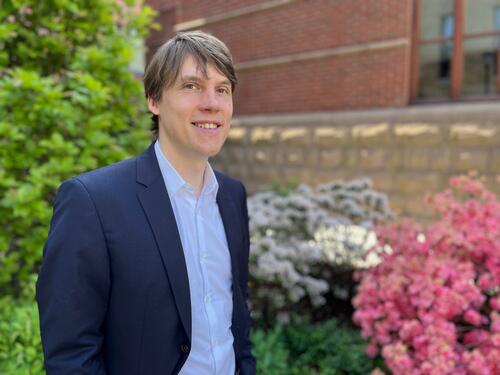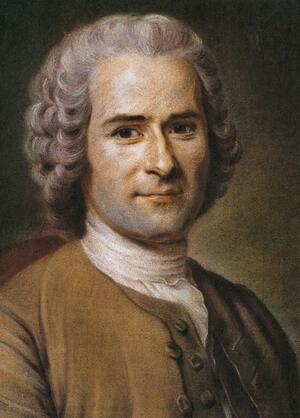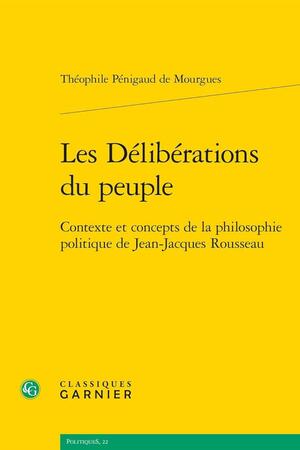Rediscovering Rousseau: Yale Political Scientist Shares Lessons for Democracy’s Future

What can a French political philosopher from the 18th century teach us about current trends of democracy?
Théophile Pénigaud, a postdoctoral associate with the Institution for Social and Policy Studies’ (ISPS) Democratic Innovations program, wrote a book based on his Ph.D. thesis exploring the work of Jean-Jacques Rousseau. Democratic Innovations aims to identify and test new ideas for improving the quality of democratic representation and governance.
We spoke with Pénigaud recently about his book, Rousseau, and how exploring the eve of our political modernity can help us understand today’s political polarization and growing trend to involve citizens more directly in decision-making.
ISPS: What inspired you to focus on Jean-Jacques Rousseau?
Théophile Pénigaud: In France, where I’m from, Rousseau is arguably the most famous political philosopher. He is widely credited with inspiring the French Revolution and is confidently one of its most explicit intellectual sources. All sides drew on its verve and authority to make their cases. Of course, I had read Rousseau early in my studies. When I felt the need to go back to the source and examine the principle of popular sovereignty, turning to Rousseau was almost a conditioned reflex.
ISPS: OK, but why now? Rousseau died in 1778. What can his philosophy tell us about today’s political climate?
TP: What motivated me to focus on his writing for my Ph.D. thesis were two fairly recent events. The first was in 2005, when the French people rejected the Treaty establishing a Constitution for Europe (TCE). At that time, I thought that “the world of the citizen” — to borrow an expression from the French historian Jean-Claude Nicolet — had become remarkably complicated and unworkable.
ISPS: What do you mean? Wasn’t it a good thing to put such an important subject to a referendum?
TP: Yes, the fact that we were invited as citizens to have a say was great progress and something I would praise in theory. But the way it was organized and publicly debated at the time was far from ideal. It felt like we were helpless. My immediate impression was that something was going wrong in modern democracy. Even when we were given a chance to weigh in on public affairs, the reasons for and against the measures were too diverse for the referendum’s outcome to make sense at all.
ISPS: Why? What was missing?
TP: It was direct democracy, but without meaningful deliberation. Many misunderstandings accumulated. First, between the elites and the people, as the major parties universally praised the TCE. Paradoxically, this very consensus bred distrust. This lack of trust is also a matter of complexity. When you are asked to approve a treaty with stakes that surpass your understanding — and it is a point of no return — you become suspicious. But even among voters, reasons for and against happened to be incommensurable. Some rejected the treaty not because they didn’t want a constitution for Europe, but to the contrary, because they wanted more than an economic partnership. The “no” did not have a consistent meaning. Finally, elected elites enacted the Lisbon Treaty two years later, seemingly circumventing the people’s sovereignty.
ISPS: I see. Let’s get back to that. What was the second event that drew you to Rousseau?
TP: The second event was the global financial crisis in 2008, which I felt fostered a feeling of political alienation and disempowerment among the citizenry. Once again, seemingly appropriate measures were enacted technocratically. But it still felt as if citizens were collateral damage in an economic and financial system that most didn’t understand, with an underlying sense of intolerable inequalities. In the aftermath, Occupy Wall Street in the United States and similar movements to address inequality and rein in corporate greed burgeoned in Spain, France and elsewhere. But they lacked any institutional support. They were too diffuse. Again, something was missing.
ISPS: Which brings us to Rousseau.
TP: Right. One important aspect of Rousseau’s political philosophy is that he rehabilitated the people’s ability to exercise sovereignty, not only in theory but in practice. He wrote that sovereignty does not merely originate from the people — it is inseparable from them. Rousseau was not hostile — as is sometimes assumed — to collective deliberations preceding votes. But only to political subtleties and manipulative leadership.
ISPS: And you see his imprint today in the growing popularity of citizens’ assemblies — deliberative bodies chosen by lottery intended to bolster public confidence in democracy and enhance policymaking.
TP: Rousseau is a famously uncategorizable thinker. But yes. If I had to put him into a category, I would say that I see Rousseau as less the forerunner of modern democracy than of the enduring practice of popular assemblies and citizens’ initiatives across the world.
ISPS: And this perspective is something you came to understand in researching your book, right?
TP: That’s correct. The Rousseau I expected to find when I began wasn’t there. The Rousseau I had learned about in my earlier education was a man mostly seen through the lens of the French Revolution and its interpretation in later political theory. This interpretation is important, but I’ve concluded that we should not approach Rousseau’s political philosophy from the context of the 1789 revolution but rather that of 1707. That is, in the context of the bourgeoisie’s struggles for sovereignty in Geneva, the French-speaking Swiss city where he was from.
ISPS: OK, so what did you conclude from this reading of Rousseau’s work?
TP: I concluded that, in Rousseau, popular sovereignty cannot be separated from physical, popular assembly. The politics of the common good is necessarily populist, in the sense that the people, properly gathered, are the sole group who are in the right position to seek and ultimately reach the common good. Because only then do self-love, group identity, and public reason walk hand in hand.
ISPS: How can something like that work in reality?
TP: Obviously, at first glance, it seems to be a limitation. It’s radical and impossible to gather the entire population. It may have been possible in 18th-century Geneva. But it’s a very puzzling contention in Rousseau’s thought that, from his point of view, only small republics or small cities could achieve his political ideal.
ISPS: Well, that seems less than, you know, ideal. How can we take away a practical lesson for today’s world from such a limited conclusion?
TP: If we agree that at the end of the day, only very small republics can achieve Rousseau’s political ideal, the question becomes: What is second best? The second best doesn’t necessarily resemble the ideal. It is not even an approximation of the ideal. And yet we must preserve what is valuable in the ideal through different paths. So, if I’m asked what the most compelling approximation of Rousseau’s ideal is nowadays—
ISPS: What is the most compelling approximation of Rousseau’s ideal nowadays?
TP: Thank you [smile]. I would say citizens’ assemblies are a very good candidate. Because they embody a species of deliberation that is precisely what Rousseau promoted.
ISPS: How so?
TP: Generally speaking, Rousseau is interpreted as an opponent to deliberation and debates. This prejudice, as is often the case, contains some truth. There are magnificent passages in his writing that focus on how disputes and public confrontations might corrupt our best intentions, leading to an inflation of arguments and rationalizations. Rousseau did not reject collective reasoning or contradictory exchanges. He did not fear the influence of arguments but the influence of individuals, of party leaders. We are now in an era of polarization, and some people may downplay or underestimate how ill-intentioned and elite-driven debates can undermine democracy. Of course, we won’t agree on everything. If there were no disagreements, there would be no politics. But the sanctification of pluralism can hide a form of epistemic laziness. Such a stance may sound illiberal. Indeed, Rousseau is frequently mischaracterized as giving fertile grounds to totalitarianism. But I think we can rehabilitate what Rousseau had in mind by focusing, as I do in my book, on his Letters Written from the Mountain, which show a place in his philosophy for contestatory democracy.
ISPS: OK. Please make your case.
TP: In Rousseau’s view, people are generally capable of seizing what matters most, especially when it comes to basic values: justice, peace, liberty. However, educated and what he called “subtle people” are able to undermine this natural or spontaneous capacity to track the truth because they are more inclined to hide their intentions and rationalize even the worst positions. Think about what has happened with the debate over climate change in the United States. It can be easy to cast doubt on something when you can’t verify it by yourself or access the truth immediately. People cannot easily distinguish between valid and poisoned discourse.
ISPS: So far, this does not sound promising.
TP: Rousseau felt that people are well-equipped to track and reach the truth. But only collectively. If you isolate individuals and overwhelm them with discourse and confrontations, they can lose this capacity. They become partisans and rivals. And at the end of the day, they never reach any truth regarding what matters to them and to the entire society.
ISPS: I see. We need people to gather in groups to deliberate. Something like citizens’ assemblies.
TP: Yes, but to me it’s not about promoting citizens’ assemblies. It’s more about the kind of politics that emerge in these assemblies, which are egalitarian in nature, consensus-oriented, and grounded in common sense and shared, reliable information. They also build trust and emotional attachments among participants.
ISPS: Why? What is so effective about putting diverse people in a room to discuss issues?
TP: Citizens gathered for these purposes can discover and experience the possibility of a different relationship to politics. One in which everyone is given the floor. Where everyone is respected. And where the trust built during the process helps overcome disagreement and keep debate based on the merit of the arguments. Whereas in traditional politics, you often think your opponent is misinformed and unable to contribute meaningfully to a discussion of the correct solution.
ISPS: So, it is the process itself that changes the dynamic to one in which people work together toward a common goal, even if they disagree?
TP: Currently, our democracy is a democracy by discussion. But a discussion is not the same as a decision. When people are gathered in a citizens’ assembly to make a collective decision, they know they are responsible for the consequences of their decision, both inside and outside the assembly. They don’t think the same way when just asked for their opinion.
ISPS: And you have seen this work in practice, as a researcher observing the 2019-20 French Citizens’ Convention for Climate.
TP: At that convention, we observed a process framed and structured to deliver influential, impactful outcome proposals. Citizen participants felt they were working on behalf of the entire population, and they believed they would have a tremendous effect on future policies, even future generations. They demonstrated a Rousseauian mindset. They tried to reach a consensus based on what mattered most to them. Of course, they were steered and assisted by external entities. They reflexively followed — and sometimes critically challenged — directives. They were skeptical when considering expert input due to potential conflicts of interest. And they were aware of how the governance committee, legislators, and even the French president might try to use the convention for their own purposes.
ISPS: Which is ultimately what happened in that instance, right? Participants were disappointed that the government failed to enact all their proposals.
TP: Yes, several proposals were not included in the bill ultimately submitted by the government to lawmayers, and other measures were considerably curtailed. But the participants also felt that they contributed to the debate on climate change and the ongoing project of improving democracy. A Rousseavian spirit ran through the assembly, in the sense that ordinary citizens were gathered to deliberate an issue for the common good and to make a collective decision in broadly acceptable and comprehensible terms.
ISPS: And you are saying there is great value in interrogating the writings of philosophers such as Rousseau, even as the world has evolved into a much different place than the one in which he lived.
TP: Rousseau’s political philosophy was designed for a form of republic that modern democracy, inspired by his thought, has since overshadowed. But his political philosophy has its own value, its own hidden treasures. To find these treasures, you first need to excavate the context. And then find ways to apply these principles today as we scrutinize our institutions and work to improve democracy.
ISPS: One last question. How has Yale, ISPS, and the Democratic Innovations program been a resource for sharing and improving your scholarship?
TP: I completed the book on Rousseau in the Sterling Library soon after joining Yale last summer. I thank my supervisor, Hélène Landemore, and ISPS for granting me this invaluable time. Since then, my research has been mostly focused on contemporary democratic theory. Yale is a fantastic place for intellectual exchanges and collaborations with people from diverse backgrounds. ISPS in particular allows everyone to work at their best. I have been provided the funds, encouragement, and institutional support to organize a meeting on deliberative committees in November and to put together a conference this spring pioneering an “affective turn” in deliberative democracy, with an emphasis on interdisciplinarity. Among postdocs, we also provide feedback to each other in a regular informal seminar organized by ISPS associate research scientist Seulki Lee-Geiller. I couldn’t have dreamt of better conditions. I look forward to continuing all these collaborations next year.